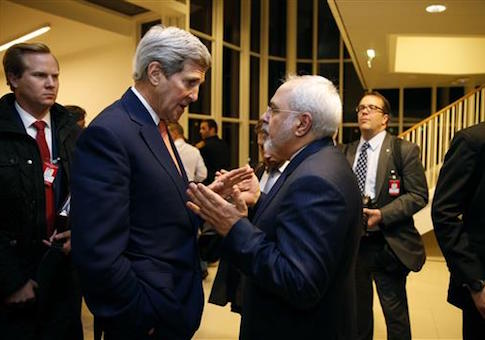The Obama administration took steps to withhold from lawmakers the details of a $400 million cash payout to Iran and continues to rebuke inquiries from Congress for information about how another $1.3 billion in taxpayer funds was awarded to the Islamic Republic, according to multiple conversations with congressional sources apprised of the matter.
U.S. officials familiar with the recent transfer of $400 million in hard currency to Iran withheld details of the exchange from Congress during briefings in classified and unclassified settings, the Washington Free Beacon has learned.
The disclosure threatens to complicate efforts by the administration to downplay new reports detailing how U.S. officials used an unmarked aircraft to transfer $400 million in "pallets of cash" to Iran on the same day it freed several U.S. hostages.
Lawmakers and others have claimed for months that the payment was part of a "ransom" aimed at securing the release of the hostages. The White House denies this claim and has said the payment was part of a settlement to resolve decades-old legal disputes with the Islamic Republic.
Nearly eight months after congressional officials demanded a formal accounting of this payment–which amounted to $1.7 billion in total–the administration is still declining to provide lawmakers with the full story, sparking outrage on Capitol Hill.
"It has been seven months since President Obama announced that he was giving the Islamic Republic of Iran almost $2 billion," Rep. Mike Pompeo (R., Kan.), a member of the House Intelligence Committee, told the Free Beacon on Wednesday. "And we are just now finding out damning details about how $400 million, which is less than half of the total, was sent to Iran using foreign aircraft and foreign currencies."
Pompeo led several unsuccessful inquiries into the cash payout. He said the administration has been stonewalling efforts to obtain a full readout of the exchange in both classified and unclassified settings since January.
Pompeo expressed anger that the administration is "totally stonewalling congressional inquiries," while leaving it to the press to unearth the details of the exchange.
"That is far too long of a timeline, especially as it is in the face of the Obama administration totally stonewalling congressional inquiries into this matter since January," Pompeo said.
"We still do not know how the other $1.3 billion was sent, and we still have three Americans sitting in prisons in Iran," Pompeo said, explaining that the bulk of the cash to Iran remains shrouded in mystery.
Congressional sources with knowledge of the situation told the Free Beacon that the State Department and other administration officials withheld details regarding the payment for more than three months–and only then provided a barebones accounting of the payout that omitted all mention of the secret cash delivery.
Sources who spoke to the Free Beacon said this was an intentional effort by the administration to keep lawmakers in the dark and prevent them from receiving a full accounting of the $1.7 billion payout.
A timeline centered around these inquires reveals that administration officials stonewalled Congress for months before providing responses that omitted any mention of the hard currency transfer.
Pompeo launched an inquiry seeking further details in January, when the legal settlement was first announced.
By mid-March, the State Department still had not responded, as was first reported by the Free Beacon.
The State Department informed Pompeo later that month in a hand-delivered letter that the information he was seeking was classified.
A classified briefing was held in late April. Sources familiar with the briefing told the Free Beacon that administration officials made no mention of the $400 million cash delivery. This information was only made public when the Wall Street Journal reported it late Monday.
One congressional source working on the issue said that the Obama administration could now spend funds set aside for American victims of terrorism on further payments to Iran.
"This just makes you wonder how far President Obama is willing to go to appease the Iranians," the source said. "Iran keeps taking American citizens hostage because it knows the administration will cave. It wouldn’t surprise me if the president has authorized negotiations with Iran over the $2 billion that is meant to go to the families of the victims of Iranian terror."
"Every action this administration has taken toward Iran has been in furtherance of the regime’s interests and at our expense," the source added. "What else is currently being negotiated between the administration and Iran? The American people deserve to know and they should demand full transparency."
A second congressional source involved in the issue told the Free Beacon that obfuscation by the administration has become a pattern and practice when it comes to Iran.
"Congress continues to press the Obama administration on every change and new policy regarding Iran," the source said. "At every turn, we are met with ‘no comment’ and further secrecy, which is why the American people do not like this deal and understand it does not make them safer."
Another source familiar with the administration’s thinking said that administration efforts to downplay the latest disclosures do no comport with the reality that this payment was part of a secret negotiation.
"The Obama admin is hoping to convince people that there’s nothing new in this scandal," the source said. "But they can’t convince members of Congress because members know that they weren’t told all the details about this cash payment for hostages. For instance, the administration has refused to fully disclose all the ways in which it has transferred money to Iran all of the time."
The White House declined on Wednesday to offer further details to reporters.
